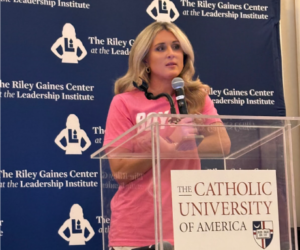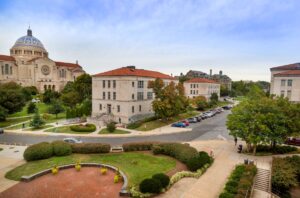Google Executive Speaks on Campus
By Duane Paul Murphy
More than twenty students, faculty, and staff attended an event hosted by Cardinal Startups which welcomed Lee Carosi Dunn, Google’s Head of International Elections Outreach. The Silicon Valley tech giant executive spoke on campus about how organizing political campaigns in the digital world is similar to business.
Before joining Google in 2011, Dunn, a 2001 graduate of the university’s Columbus School of Law, started out as a judicial law clerk for Claude M. Hilton, former chief judge of the United States District Court for the Eastern District of Virginia. After clerking on the federal bench, she went to work as legal counsel for Dow Lohnes, a former law firm whose clients included Cox Communications and AOL. For eight years between 2003 and 2011, Dunn was general counsel for Arizona Senator John McCain in the U.S. Senate and even volunteered for his 2008 presidential campaign, as well as 2010 re-election senate campaign. Besides her work at Google, Dunn is currently distinguished fellow at the university’s Ciocca Center for Principled Entrepreneurship.
Throughout the event, Dunn explained how Google’s products and services can become great digital resources for running a modern political campaign in any election year. According to Dunn, one of the most effective products Google offers when running a political campaign online is YouTube. She said that longer political advertisements that are more than 2 minutes as well as biographical get more views than ads that are often skipped or lack views. They are starting to target not only younger demographics of those between 18 to 35 years old, but also middle aged and elderly users who look up “how to” videos, specifically partnering with AARP to help senior citizens fill out Social Security and Medicare federal applications.
When asked about the public concerns of the spread of fake news and misinformation during elections worldwide, Dunn said that companies such as Google can become more transparent about information sources and authenticity on their own. In countries such as the United States the internet is less regulated and issues with freedom of speech, press, and expression could arise legally.
Many students in attendance enjoyed the event and Dunn’s political experience in the digital sphere.
“As political campaigns look more towards technology, it was nice to listen to a leading figure in the tech industry,” said junior international business major Sean Hofving.
Other students were glad that Dunn was able to attend as an employee of a major multinational corporation.
“Google is one of the biggest companies in the world and to have Cardinal Startups host one of their employees is a blessing,” said junior management major and student president of Cardinal Startups James Turner. “Ms. Dunn gave an incredible talk on how Google can help startup companies.”







